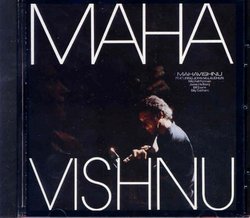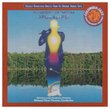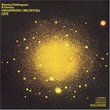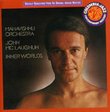| All Artists: Mahavishnu Orchestra, John McLaughlin Title: Mahavishnu Members Wishing: 4 Total Copies: 0 Label: Wounded Bird Records Release Date: 6/18/2002 Genres: Jazz, Pop Style: Jazz Fusion Number of Discs: 1 SwapaCD Credits: 1 UPC: 664140519022 |
Search - Mahavishnu Orchestra, John McLaughlin :: Mahavishnu
 | Mahavishnu Orchestra, John McLaughlin Mahavishnu Genres: Jazz, Pop
John McLaughlin is regarded as one of the greatest guitarists in the history of music. Making albums from the 60's through the present, his intense guitar work with The Mahavishnu Orchestra and Miles Davis gave birth to... more » |
Larger Image |
CD DetailsSynopsis
Album Description John McLaughlin is regarded as one of the greatest guitarists in the history of music. Making albums from the 60's through the present, his intense guitar work with The Mahavishnu Orchestra and Miles Davis gave birth to jazz/fusion. In 1984 he formed a reincarnation of sorts of The Mahavishnu Orchestra. Featuring original Mahavishnu drummer Billy Cobham, plus saxophonist Bill Evans and bassist Jonas Hellborg, this high-energy electric album is regarded as one of his best efforts and has been his most sought after album for CD reissue. It is making its worldwide CD debut! Wounded Bird Records. Similar CDs
|
CD ReviewsGreat players, great sounds Farhad Bahrami | San Diego, CA United States | 12/02/2004 (5 out of 5 stars) "The players here are great: Billy Cobham of course in his only comeback to Mahavishnu, Bill Evans on saxes/flute, Mitch Foreman on keys, and bass monster Jonas Hellborg. And as for McLaughlin, if you like John's music - which I love - he is his usual fired-up but meditative self. The sound, as other reviewers have pointed out, is all electric, and if you like that sort of thing, there are some wonderful voices: listen to the awesome "violin" (synth guitar) on the opening "Radio-Activity", or the "trombone" (synth guitar or keys?) on "Florianapolis", or the fluttering duetting flutes (one real, one synth guitar) on "Pacific Express". While I agree with other reviewers that not all the tunes will end up as standards, I think that a few really should: "Nostalgia" is a beautiful ballad (with a great solo), and "Pacific Express" - with it's flowing melody over driving rhythm section - is unforgettable. I had this album on LP and got it as soon as it came out on CD. If you like electric jazz, you'll like this. " A Fusion of Sounds PristineAngie_dot_com | NYC | 03/07/2006 (4 out of 5 stars) "The eighth record of John McLaughlin's cult fusion band Mahavishnu Orchestra is now truncated to simply "Mahavishnu." Any records utilizing cutting edge technology always risks sounding dated years later. It is in this context one needs to listen to content while consciously filtering out the overcompressed drums, the 80s handclaps, and the biggest culprit of them all: those Yamaha DX7 keyboard stabs.
For well-seasoned fans of John McLaughlin's furious guitar shredding abilities, the Synclavier II guitar synthesizer actually triumphs in its realization of this musician's signature sound. Listen carefully to McLaughlin's unadorned, slippery pearl-like notes on Miles Davis's Live Evil from 1970 and you will find that the Synclavier II's timbre-shaping features allowed McLaughlin not only to bring his esoteric tone into the modern era, but improve on the microtonal bends that he has produced with a scalloped fretboard on many of his guitars throughout his career. Keep in mind that the root word of fusion is fuse. McLaughlin has alternately fused musical genres as well as different ranges of tempi and extremes in amplitude as bandleader of Mahavishnu. So it should come as no surprise that when he got his hands on a guitar synth, he would naturally attempt to fuse sounds, whether it be wave-shaping or overlays of patches. To expect a petrified version of his 70s electric guitar wail, as much as we all love and yearn for it, is to stand in the way of progress. Radio-Activity introduces the Synclavier II: A descending howl dissipates as a string of notes mysteriously snakes its way out of the abyssal darkness like a Erenna specimen. The unmatched McLaughlin speed is captured, a testimony to just how far ahead of the times New England Digital was with their technology, as tracking and latency (the ability to capture every note without a time lag ), is still way below par in this day and age of guitar synthesizers. Billy Cobham, a Mahavishnu Orchestra alumni from the debut album onwards, is happily present, with his tight rocking style. Nostalgia is a mellow ballad featuring Bill Evans the saxophonist (not to be confused with Bill Evans the pianist, who was a great influence to McLaughlin) on soprano sax. One begins to see how this reed player's tone complements the rounded timbre McLaughlin is going for. Nightriders sounds very eighties-dated as a shuffle around a riff, with the musicians taking turns vamping. Straight distorted guitar is featured, periodically punctured by a stray handclap sample that appears to have escaped from Phil Collins' studio. East Side West Side is a Bill Evans vehicle enabling the saxophonist to trade his Michael Brecker runs against Mclaughlin's Synclavier at full speed. This piece sounds as if it could be an exciting out-take from Saturday Night Live's opening theme song, which Brecker played on for many years. Clarendon Hills can only belong in an ABC televised Olympic feature story segment, ending in a variation of the four note ostinato from A Love Supreme. Jazz gets interesting again, with Cobham's crisp syncopated drumming highlighting Hellborg's fretless bass, a perfect match to East Side West Side as we ride inside the mind of McLaughlin as he takes us across Manhattan. The Unbeliever is an atmospheric where the drums play a more lyrical role within the composition. Pacific Express is a fast jati using sample waveforms to create gamelan-like timbres benath Hellborg's playful fretless bass, before switching into a more traditional jazzy ensemble. Then we return to the first form, with one fantastic passage after another of fretless bass work that shows Hellborg as a heir to the Jaco crown. When Blue Turns Gold is unarguably the most beautiful piece on the album. A dazzling conservatory piano run opens into a ruefully singing flute bending across tablas, handclaps, Indian percussion, and a strumming steel-string acoustic. It becomes apparent at this point that the flute, played in this style, is among the inspiration McLaughlin has to building his Synclavier sound." |

 Track Listings (9) - Disc #1
Track Listings (9) - Disc #1

